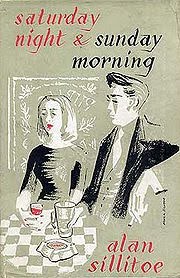Sillitoe was born to a family of straitened means in Nottingham, England. He left school at 14 to working in a factory and then, under-aged, joined the RAF. It was during this time he contracted tuberculosis giving him the time to begin writing.
His novels gave an anti-authoritarian voice to the working class and depicted the reality of life in England after the war. As a writer he was labeled along with other so-called Angry Young Men (Philip Larkin, Kingsley Amis) and his subjects were often refered to as “kitchen sink realism” (thnk Coronation Street). Sillitoe and the other Angry Young Men rejected this name, disliking any sort of label. His novels will be remembered as, not only terrific stories, but also as works of social criticism. They were also considered groundbreaking for his use of vernacular working class dialect.
One of his later works, Birthday, revisits Arthur Seaton (of Saturday Night and Sunday Morning) as an older man. Arthur is a little mellowed by time but has not lost his fire. Sillitoe faces aging head-on not s
Sillitoe has left behind a large body of work which is already considered to be classics of his generation.

